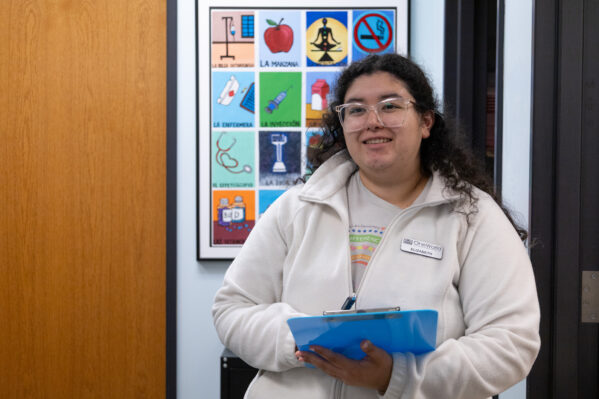Nursing staff chart a course of healing through connection

OneWorld’s Health Assistants and Medical Assistants – who have varying levels of training and certifications – comprise the nursing staff team. Their responsibilities are vast and depend on clinical setting, but typically a member of this team is with a patient from start to finish.
Team members receive on-the-job training. What matters more, though, said Associate Director of Nursing Tania Murrell, is a willingness to overcome barriers and to “find pathways to yes.” She said community members who have faced barriers themselves bring passion to the work.
“We’ve been blessed that way, that sometimes our own community has the gifts that propel us going forward,” Murrell said.
***
Every time the young patient came in for an appointment, she remained silent. Clinic staff at the School-Based Health Center knew not to expect a verbal response from her – she was very shy and reserved.
But that didn’t stop staff from attempting to build rapport with her. Elizabeth Chavez-Troester, Certified Clinical Medical Assistant 5, waved hello to the student in the hallways. She learned the student liked cats, so every time the student came in, Chavez-Troester gave her a cat sticker. She hoped, eventually, the student might feel confident enough to speak to the staff.
One day, after a co-worker took the student’s vital signs during an appointment, Chavez-Troester heard a voice. She asked her co-worker to repeat herself … but it wasn’t her co-worker.
“It was actually the patient,” Chavez-Troester said. “It just threw us by surprise because we had never heard her speak until that day.”
It was just a brief sentence, yet that first sentence aloud came after six to eight months of continued effort to build connection. Creating a sense of safety takes time.
“Our team has to know how to connect with patients and gain their trust regardless of their age, regardless of what’s going on at that day for that visit,” said Associate Director of Nursing Tania Murrell, who oversees members of the nursing staff team. “They have to find a way to connect with all of them, and they do.”
It’s a character trait that underlies all the technical competencies that are also required of nursing staff. Murrell said members of the team – which comprises Health Assistants and Medical Assistants – thrive on making a difference, taking care of their community and challenging themselves.
“They don’t do it so that it’s highlighted, they do it because that’s what feels good for them,” Murrell said. “That’s what morally they find correct, and so they want to live by that.”
Many incoming nursing staff at OneWorld are early in their careers. While prior experiences vary, staff members often start as Certified Nursing Assistants, or CNAs (at OneWorld, CNAs are called Health Assistants).
Medical Assistants (MAs), by contrast, have an associate’s degree – about two years of training compared with a much shorter CNA program. Another way to become an MA is through OneWorld’s in-house Certified Clinical Medical Assistant (CCMA) program, an accelerated version of associate’s-level training.
At OneWorld, nursing staff roles are indicated by levels 1-5, with each level carrying new competencies – from rooming patients to drawing labs, and from assisting providers with procedures to running insurance. All members of the team must also become Med Aids, meaning they are certified to administer medication.
Different levels may also be required depending on clinical location. OneWorld’s specialty clinics are staffed by level 5 MAs. That’s because staffing at these locations is lean, and MAs must have a broad skillset.
“Sometimes, at a School-Based Health Center, we’re the first person that patients meet,” said Chavez-Troester. “We’re doing front desk and we’re doing rooming and back clinic, so we’re the first point of contact … If you don’t make a good impression or you don’t connect with that family, they’re not going to have a good impression of the clinic. I feel like that is so crucial and just being so empathetic towards them because they all come with different stories, especially in the School-Based Health Centers.”
Chavez-Troester began at OneWorld as a Health Assistant, with prior experience in both hospital and clinic settings. When she saw the job posting for a OneWorld School-Based Health Center, she was intrigued. And when she interviewed for the job, the conversation reminded her of how much she enjoys the close-knit community feeling of a small clinic.
About a year into her new job, she nervously decided to apply for OneWorld’s CCMA program. The materials overwhelmed her at first. But, on test day, encouraging words from a coworker reminded her of everything she had already learned: “Just remember like you’re in clinic. You don’t really think about these steps, you already know them. It’s just muscle memory.”
Murrell affirms the high volume of information nursing staff must learn and use. In fact, she said that when Clinical Education and Regulatory Quality Manager Amari Ware compiled a competency checklist for CCMAs, the list spanned a whopping 39 pages.
Still, team members don’t keep to-do lists in their head, Murrell said. Instead, they envision the end results.
And in the case of the student who stayed silent for months, Chavez-Troester knew a path to connection didn’t lie in a checklist. It came through paying close attention, building trust and cat stickers.
“They’ve got the answers, they know how to do it,” Murrell said. “As long as they’ve got the support, they’ve got that emotional well-being at work, they’re able to do some really, really hard things.”



